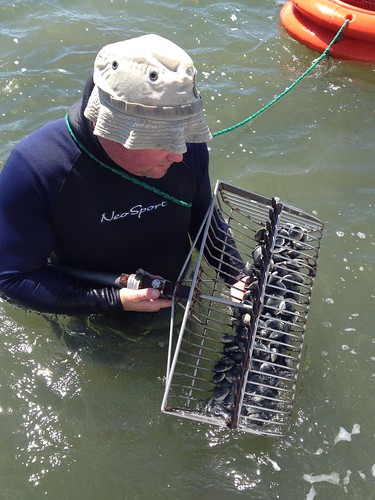
Raising clams was always a part of Michael McCarthy’s life — until Sept. 11, 2001.
McCarthy was working with the New York/New Jersey Harbor relay program, purging and harvesting clams, when terrorists crashed two airplanes into the World Trade Center. “You could look across the water and see the towers. That was my motivation. We were shut down for a couple of weeks and that’s when I decided to join the Marines. I knew I wasn’t going to do it for the rest of my life, but I felt like I did something to help a little bit.”
Following his honorable discharge from service, McCarthy returned to New Jersey and reconnected with the clam industry he has loved since he was 5 years old, but this time it was different. The industry became more than just a part-time, high school job, or a means to earn money during college breaks. This time, he was going to do it on his own.
It took a few years, but by 2008, McCarthy oversaw millions of seeded clams on his own bed space while being mentored by the owner of New Jersey’s Bayfarm Inc., an industry seed supplier and known advocate for conservation in Barnegat Bay. He took that knowledge and became active in improving the health and status of the New Jersey shellfish industry, while continuously expanding his own operation.
Business was good and in 2014 McCarthy was ready to take his business to the next level, but he needed help. That’s when he learned about USDA’s microloan program, administered by the Farm Service Agency, and their efforts to help returning military veterans to pursue agriculture as a career. In fact, USDA is working closely with the Department of Defense and the Veterans Administration to integrate agriculture into the career training and counseling programs offered to service members as they transition out of the military.
For Michael, a little investment capital was needed to support the next stage of growth for his small business. He applied and qualified for the microloan, allowing him to purchase a custom built packline that counts and separates clams by size, and screen cover material that allows him to expand inventory across more acreage and protect the clams.
“The microloan helped me become more efficient. I’m building my business and I’m almost where I want to be,” said McCarthy.
Since 2009, USDA has provided $443 million in farm loans to help more than 6,505 veterans purchase farmland, buy equipment and make repairs and upgrades to farm businesses. Microloans — for small- or niche-type farms — have provided more than $24.2 million in support to help more than 1,150 veterans across the country since the program launched in January 2013.
For more information on USDA’s efforts to help veterans, visit www.usda.gov/veterans. To learn more about microloans, visit www.fsa.usda.gov/microloans. And to learn more about FSA programs, contact your local FSA office. To find your local office, visit http://offices.usda.gov.
